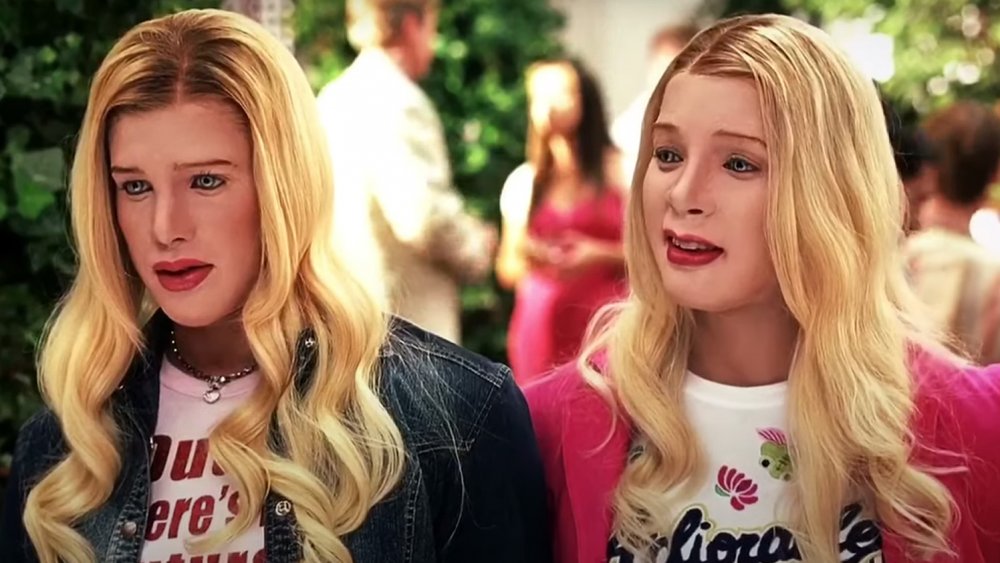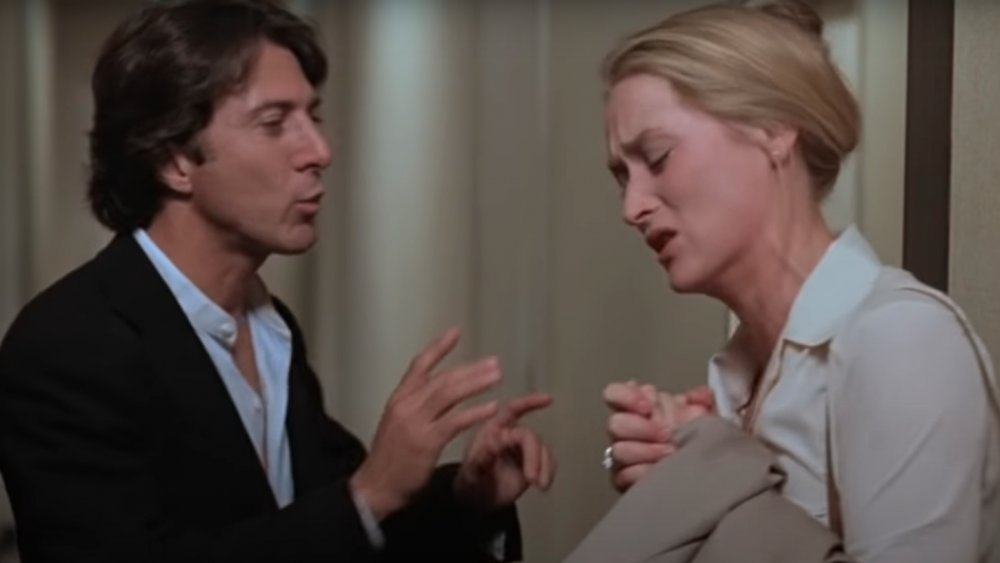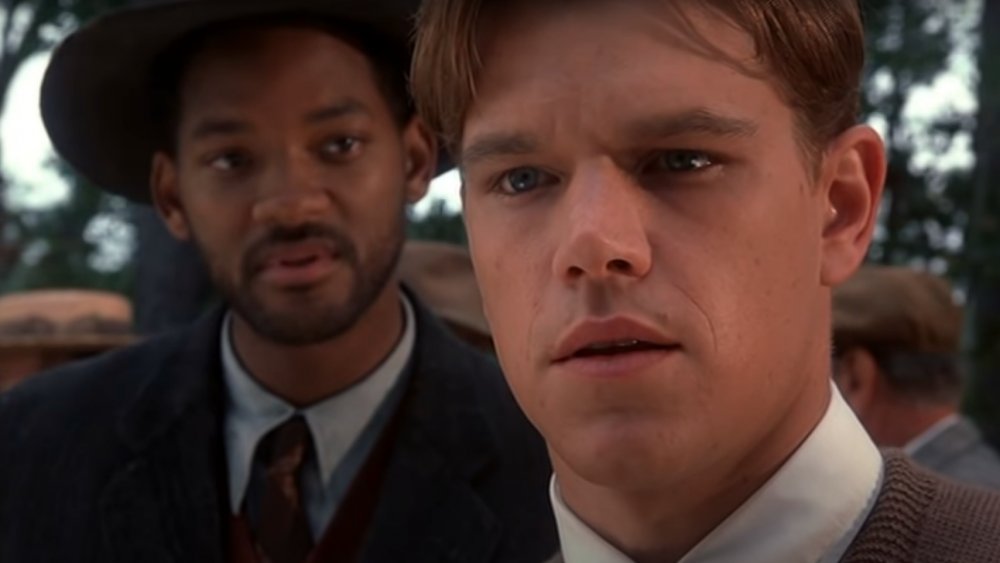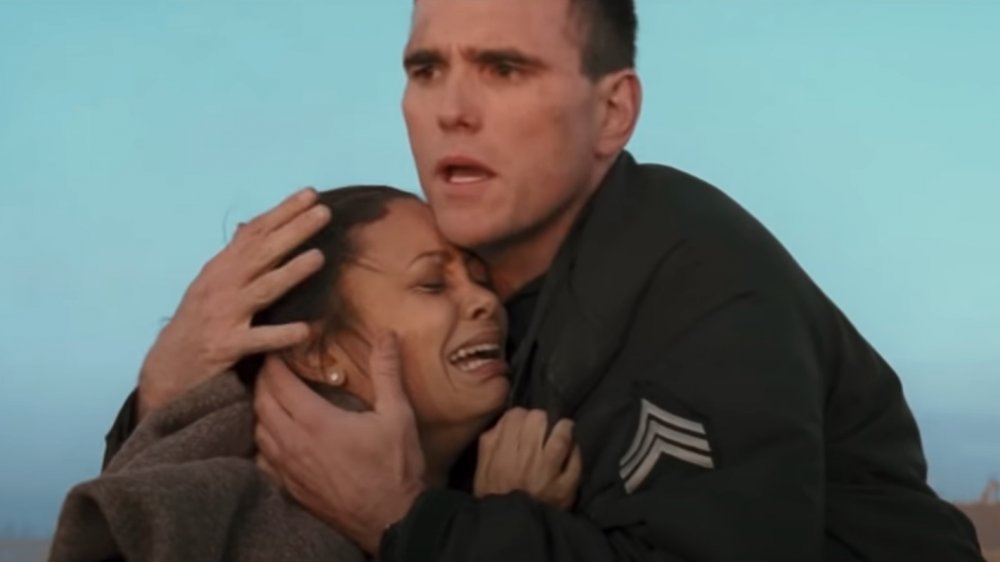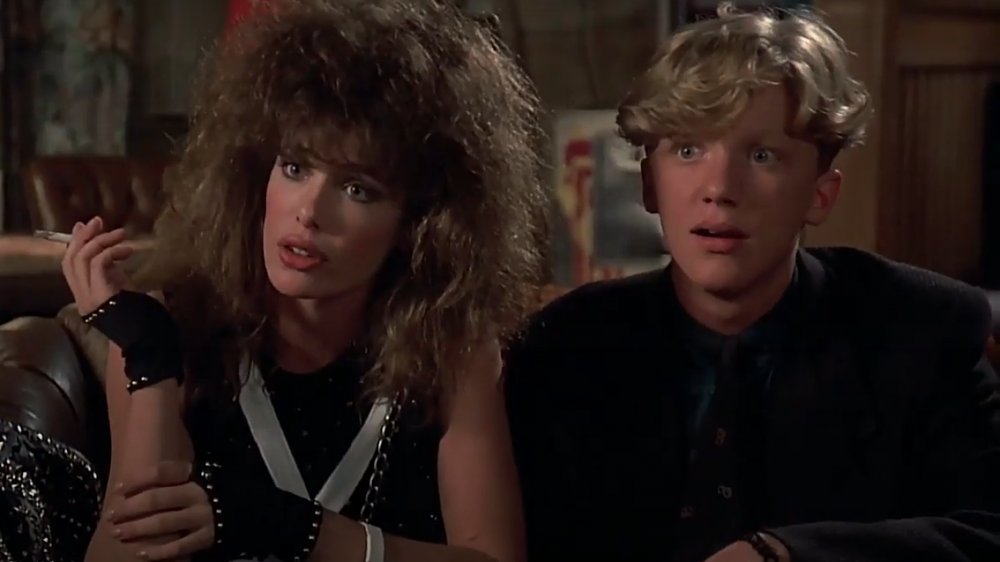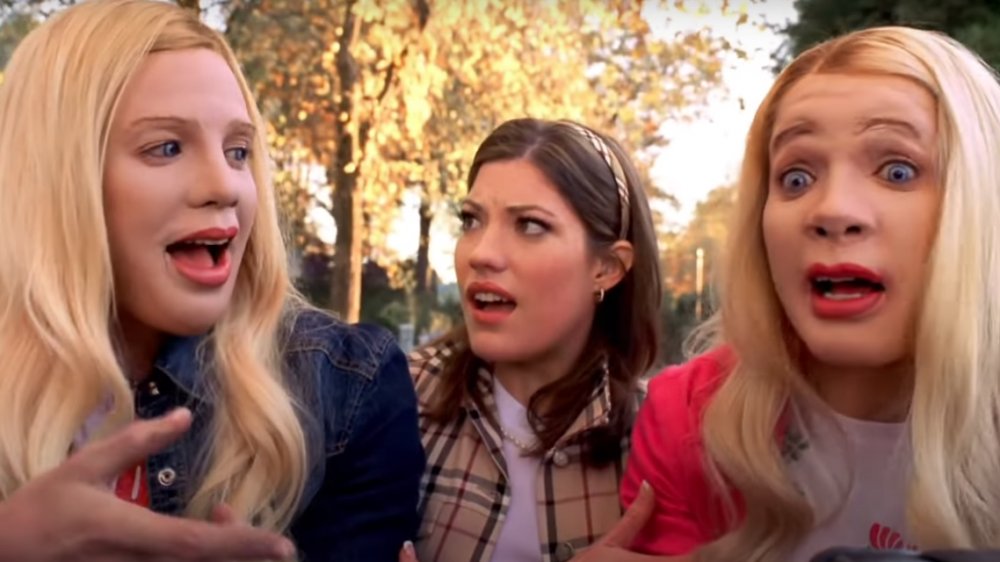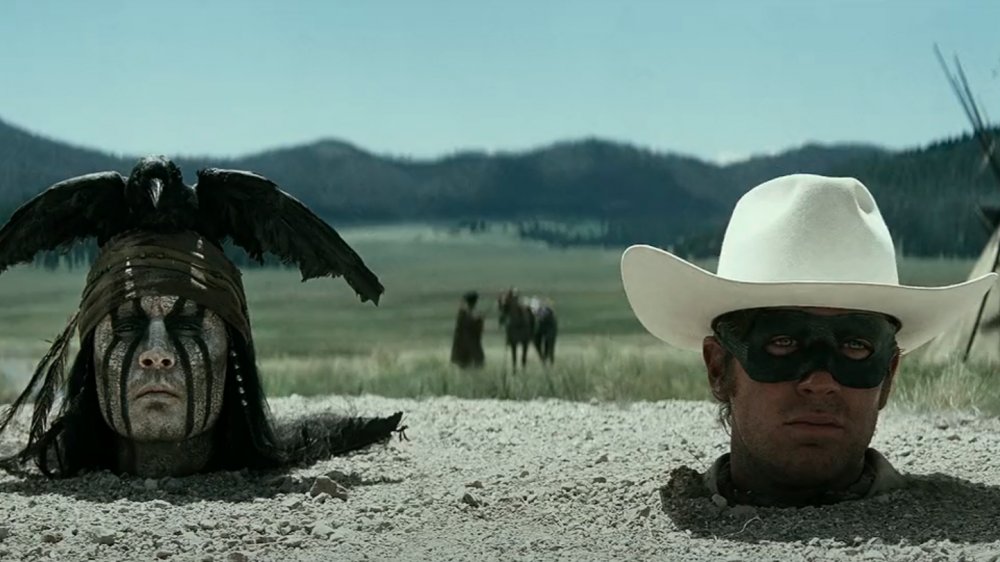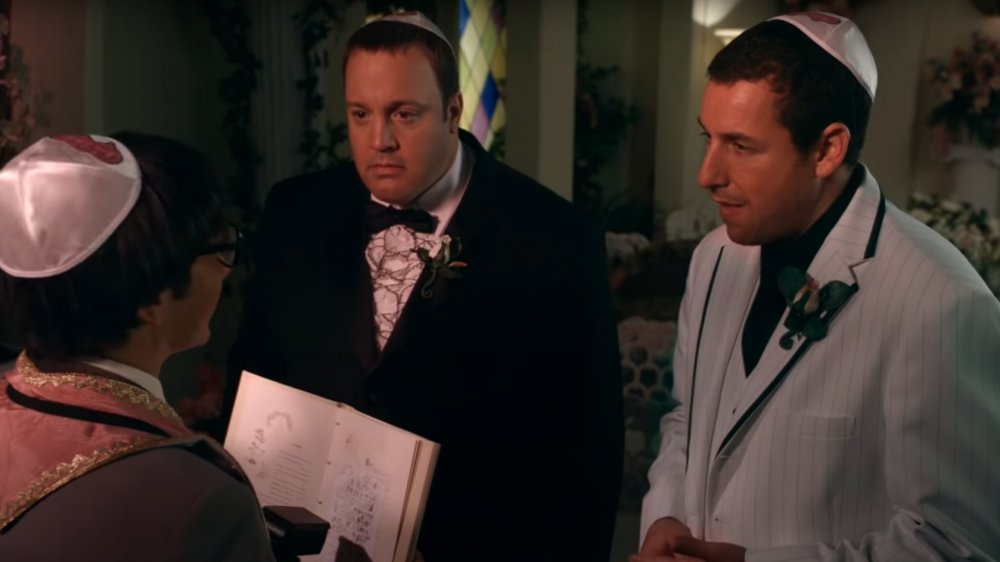Famous Onscreen Pairings That Would Never Work Today
No film is truly ever safe from time. As the years go on, production values increase immensely, the art of acting evolves, and filmmakers and audiences become more knowledgeable and critical. Time also creates new contexts and new perspectives in which films are judged. Things that worked in the past may not always work. This can include the technical elements, the plot lines, or even the character or actor dynamics, which is what we're interested in here.
Movies often rely on the relationships between two characters as a driving force, but what happens to the film in time, when those relationships no longer work? We just write it off as "different times." Streaming services may add disclaimers that warn about "outdated cultural depictions" or completely remove the now-controversial films from their libraries. Most of the time, however, filmmakers, film academies, and audiences can learn from these films — or not learn from them, like we saw Driving Miss Daisy and Green Book.
To get a better idea of what movies feature problematic partnerships, we decided to examine some of the more famous onscreen pairings that would never work today.
This kind of on-set abuse is 'being corrected' now
Before she broke award season records, including an astounding 21 Academy Award nominations and 32 Golden Globe nominations, Meryl Streep was a young actress battling her way through the industry against established veterans, like Dustin Hoffman. Appearing together in Kramer vs. Kramer, the two made movie magic, but the process in getting there was as problematic as it gets.
According to Michael Schulman' Vanity Fair adaptation of his biography Her Again: Becoming Meryl Streep, Hoffman used various forms of abuse to draw a performance out of Streep. "Dustin and Meryl took their positions on the other side of the apartment door. Then something happened that shocked not just Meryl but everyone on set," Schulman writes. "Right before their entrance, Dustin slapped her hard across the cheek, leaving a red mark." Schulman recalls Hoffman abusing Streep in other ways as well: "He started taunting Meryl about John Cazale [her recently deceased fiance], jabbing her with remarks about his cancer and his death."
In an interview with The New York Times, Streep addressed the slap. "This was my first movie, and it was my first take in my first movie, and he just slapped me," she said. "And you see it in the movie. It was overstepping. But I think those things are being corrected in this moment. And they're not politically corrected; they're fixed. They will be fixed, because people won't accept it anymore. So that's a good thing."
Modern audiences aren't feeling this racially insensitive pairing anymore
In 2000, the movie was called The Legend of Bagger Vance, but it could have been called Happy Gilmore, What Dreams May Come, Ghost, or the Green Mile. In each of these films, a Black character possesses mystical powers and uses them to help white characters reach their full potential or satisfy their goals. Similar tropes have been used for generations, which, according to director Spike Lee, is just a reimagining of older fictional portrayals of minorities to satiate white audiences. In a Yale talk, the director spoke about Will Smith's Bagger Vance and his nonsensical relationship with Matt Damon's character.
"Blacks are getting lynched left and right," he said of the Georgia-set Depression-era film. "And [Bagger Vance is] more concerned about improving Matt Damon's golf swing! ... They're still doing the same old thing ... recycling the noble savage and the happy slave." More modern fare, like 2017's Same Kind of Different as Me and 2016's Mr. Church, employed versions of this trope to the disdain of critical contemporary audiences. "Even 150 years after slavery has ended, white people still feel more comfortable with a black person if they don't have to recognize their full humanity," podcast host Jonathan Braylock told NBC News. "This is why films that deal with slavery or films that have a magical negro are the most rewarded by prestigious institutions. They only explore the outer edges of the black experience and refuse to recognize that being black is normal."
This take on racism probably won't crash the Oscars again
Since its 2005 release and subsequent Academy Award win for Best Picture, the merits of Crash have been critiqued thoroughly. It's been called the worst Best Picture winner ever and frequently called out for its rather convenient and surface-level look at racism. The Independent suggested it was just another film "made by white people in order to soothe white audiences by minimizing the real scope of racism." While it's an ensemble film, one of the key setups revolves around Matt Dillon's racist cop character and Thandie Newton's character, who he assaults at a traffic stop. "Later, in the movie's big action set piece, Newton's character is trapped in a burning car and — improbably but perhaps predictably — the first responder is Dillon, who risks his life to save her," writes The Atlantic. "This is supposed to be redemption for his racism and his earlier sexual assault of Newton. (Or something.)"
In the years since the film's release, police injustices against the Black community have only grown, which has made Crash seem more tone deaf than it ever was. "Watching the film now, its depiction of why we can't all just get along appears maddeningly untethered to the ways Americans actually experience (and, sometimes, help perpetuate) distrust and prejudice," Tim Grierson of The New Republic wrote. "[Filmmaker Paul] Haggis ... never claimed to solve racism with Crash, but his movie did something almost as offensive: reduced a societal ill to a narrative device."
Weird Science would not get a passing grade today
While director John Hughes gives female lead, Lisa (Kelly LeBrock), more agency in 1985's Weird Science than most of his films, there is no shortage of problematic moments from the film. Critic Rita Kempley of The Washington Post saw then what many viewers took years to catch on. "Unbelievably, John Hughes, the maker of Sixteen Candles and The Breakfast Club, writes and directs this snickering, sordid, special effects fantasy, with Kelly LeBrock in a demeaning role as love slave to a pair of 15-year-olds," she wrote. "She has the body of a Playmate, the brains of a genius, the mouth of a sailor and the urges of a pedophile."
The latter part is the biggest problem. Part of Lisa's programming has her yearning to be a sex slave for the young boys. In addition to sexually propositioning the kids, she even attempts to sleep with one of them. Regardless of whether she goes through with it or not, the setup still puts the viewer in an awkward position. In the years since the film, others have tweaked this perversion of the Frankenstein tale. Joss Whedon on the GeeksOn podcast, for example, spoke about how Weird Science inspired him to create a newer version of this story in Buffy the Vampire Slayer. "I hate Weird Science not a little. I find it offensive," he said (via iO9). "The boy fantasy of building a girl. Obviously, we were doing the nasty version of it, because I find it grotesque."
No one wants to see White Chicks 2
One of the outcomes of the widespread Black Lives Matter movement in 2020 was the renewed criticism of shows and films that have used blackface in the past. According to Radio Times, at least 14 TV shows or films were "removed from" streaming services as a result. Somewhere among these discussions about the use of blackface and its roots in brutal racism were whispers about White Chicks, a comedy from the Wayans family.
In the 2004 film, the two Black leads, Marlon and Shawn Wayans (shown above), play FBI agents who don whiteface in order to protect two "white chicks." While Twitter users rightly debated if the film was actually harmful at all, and if whiteface carried any traumatic weight for white viewers, the reality is White Chicks would probably not get made in today's climate. Even Today personality Al Roker condemned the film, though his dig may have been a little tongue-in-cheek.
The fact that the film generates any outrage at all, regardless of how rational, would likely take it out of the running today. Few studios would likely want to take on the risk of backing a film that deals with both race and gender swapping. Still, there were rumors about a sequel to the film. While Marlon Wayans confirmed the sequel isn't happening, he did suggest that it was the "perfect time" for it.
Tonto's makeover would not go over today
Something about the classic TV character Tonto never struck the right chord with Johnny Depp, so when it was his turn to tackle the role, he wanted some changes. "I started thinking about ... what could be done in my own small way try to — 'eliminate' isn't possible — but reinvent the relationship, to attempt to take some of the ugliness thrown on the Native Americans, not only in The Lone Ranger, but the way Indians were treated throughout history of cinema, and turn it on its head," he told Entertainment Weekly.
The actor further claimed, "I guess I have some Native American somewhere down the line" and was even made an honorary member of the Comanche nation (per The Guardian) — but many were skeptical. After all, Depp also told EW that he found it "interesting" that "somewhere along the line" most people that have "Native American blood" are "the product of some horrific rape." Yikes.
Then the movie was released and Depp's Tonto was still problematic. "Tonto, as played by Depp, is a collection of mannerisms and affectations, but not a character," wrote Jason Bailey of Flavorwire, who actually characterized the overall film as "too racist to reboot." He added, "[Depp] maintains the most culturally damaging element of the role, his definite article-free dialogue, with lines like, "Do not touch rock. Rock cursed." Even The Onion joined in, satirically beating up on Depp's "stoic, thoroughly researched portrayal of the spirit warrior Tonto."
Today's audiences would object to this on-screen marriage
Adam Sandler is no stranger to controversy. He could have found his way on this list for a few of his films, but we're looking most closely at I Now Pronounce you Chuck and Larry. This film is rife with issues, as a Vice piece summarized 10 years after it was released: "Racist jokes abound, most egregiously with Rob Schneider's performance as a Chinese wedding minister; Adam Sandler objectifies and dehumanizes nearly every woman who appears in the film; the plot itself is wall-to-wall gay panic humor."
The concept is simple, overdone, and outdated: walk a mile in someone's shoes to learn to appreciate them, or, more specifically, Sandler and Kevin James get married to get insurance money and then learn to appreciate gay people along the way. The film tries to skirt by offensiveness by pretending it's in on the joke. As Stephanie Zacharek wrote in Salon, "Many of the gags in I Now Pronounce You Chuck and Larry are a little too 'Some of my best friends are gay' to be particularly smart." Now that LGBTQ+ rights and visibility have increased by orders of magnitude since 2007 — both on-screen and in real life in 2013 when The Supreme Court effectively made gay marriage possible — a film like I Now Pronounce you Chuck and Larry feels like it's from a far off time and place.
Is it wrong to use live animals on film?
While CGI created many of the tiger images in Life of Pi, four live animals were used to get various shots. At least one of the tigers, named King, was allegedly put in danger, according to an investigative report by The Hollywood Reporter.
In an email obtained by the outlet, the American Humane Association monitor on the film, Gina Johnson, alleged, "Last week we almost f—ing killed King in the water tank. This one take with him just went really bad, and he got lost trying to swim to the side ... damn near drowned." Later, Johnson appears to suggest that she intentionally misrepresented the seriousness of the event in her report on the incident. "I think this goes without saying but DON'T MENTION IT TO ANYONE, ESPECIALLY THE OFFICE!" Johnson continued. "I have downplayed the f— out of it."
Afterward, both Fox studios and director Ang Lee also "downplayed" the event. "The tiger, King, was never harmed and did not 'nearly drown' during the production," a Fox spokesperson told The Hollywood Reporter. "We take on-set safety very seriously and take every precaution necessary to ensure that no one — animal or human — is harmed during the production of our films."
While it's unlikely that the use of live animals in films will ever go away completely, as PETA continually advocates, it's clear that mainstream outlets are concerned with both the safety and ethical issues involved in the practice.

